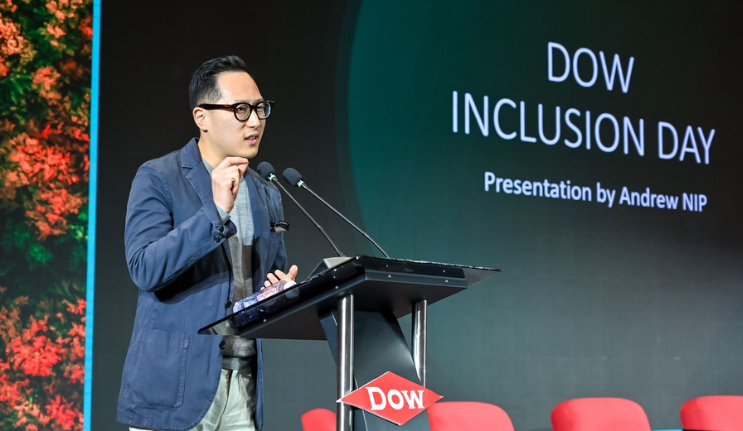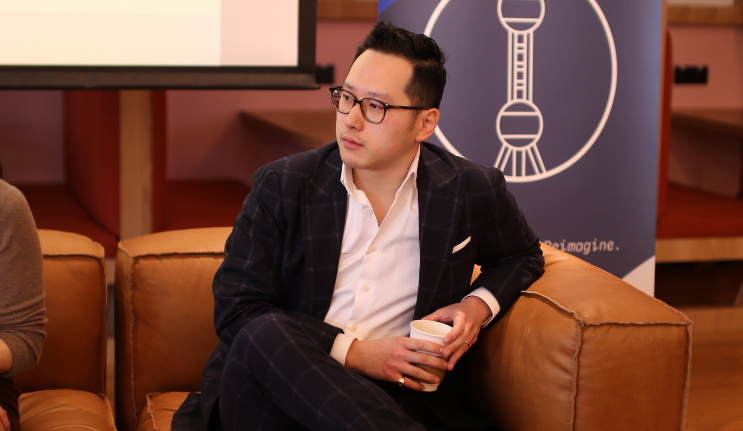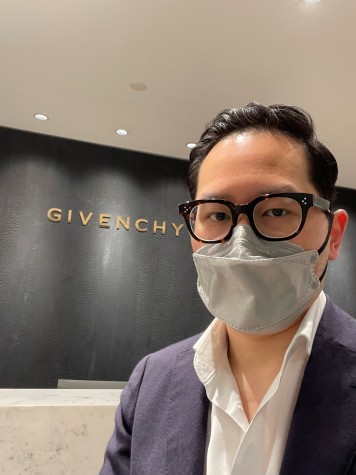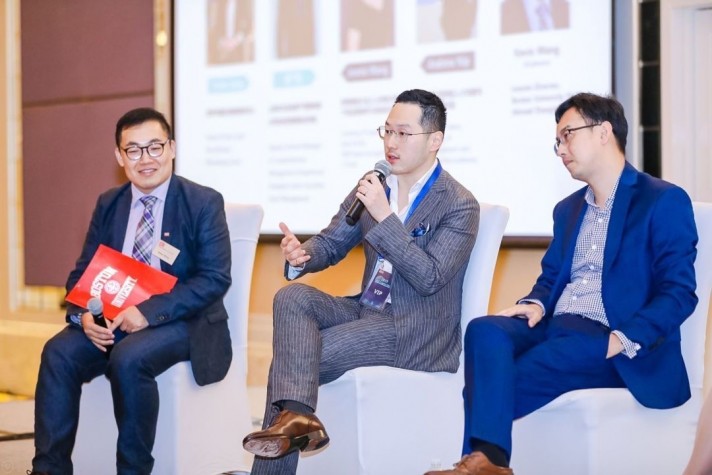
ALUMNI FOCUS
Third-culture kid
Who is Andrew Nip? It’s a good question, and one he’s spent a long time trying to understand. Having spent his formative years between Hong Kong and Australia, Andrew says he identifies as both Chinese and Australian. After completing a combined Bachelor of Arts (Psychology) and Bachelor of Human Resource Management at MQ, he moved to Shanghai, where he is thriving in what he calls the middle ground. No less, he brings this deep understanding of living between cultures to his work, encouraging equity, diversity and inclusion in the workplace from a place of lived experience. A skill that has prepared him well in the diverse Asia market.
‘If you ask me where I’m from,’ offers Andrew, ‘I’m not sure how to answer. I don’t really see myself as being from one place,’ he says, starting to unravel the important issue of identity, which he has leaned into.
‘I speak Chinese, my parents are from China, and I speak Chinese with them,’ he continues from a quarantine hotel outside his home city of Shanghai, having returned from business in Singapore and Hong Kong. ‘And I’ve now lived in Asia for half my life.
‘While it’s obvious I’m Chinese, my citizenship is Australian, and I spent my formative years in Australia. I speak fluent English, and many of my friends will say I’m very westernised in my thinking. I’m what you’d call a third-culture kid,’ he says proudly.
‘It’s a relatively new term – there are a lot of third-culture kids in Australia, being so multicultural – but the idea is, you don’t really fit into a single national identity or culture. Where your parents come from, where you live, and your citizenship are all different. It’s a great thing,’ he says.
But living between cultures hasn’t always been easy. ‘It has taken a long time to feel comfortable in the middle, and it hasn’t always been pleasant,’ he admits. ‘When I first came to China, I looked Chinese and spoke Chinese, but I wasn’t fluent.
‘People would call me a banana – Asian on the outside but western on the inside – and some people didn’t think I understood China. Even now, when I write in Chinese on social media, people are like, oh wow, you know how to write Chinese!
‘It was a journey of accepting that I’m not defined by one culture, I am a product of both, and embracing that as opposed to either forgetting one identity or hiding the other. Coming to China has allowed me to embrace that.’
It was 12 years ago that Andrew, an early-career HR professional with Hays, was sent to Shanghai to help establish the business and develop local leaders. ‘When I joined, the Hays leadership team in Asia was predominantly expatriates,’ he explains.
‘It’s called the bamboo ceiling, and hasn’t been talked about much. I was interested in understanding the barriers that stop people who are not western, or westernised, from progressing to the top level in a multinational organisation.’
‘It’s complex, but this is where cultural nuances come into play – leadership is defined very differently in China to the west, for example, and good leadership qualities manifest very differently in different countries, particularly in Asia. So that’s what I was focusing on at Hays.’
One of the first people Hays sent from Australia, Andrew says, ‘It was meant to be for two years, but I loved working in China and really liked my job. Business was growing, and I’d established a life here, so I decided to stay.’
Still, even though he had progressed up the career ladder to Head of People and Culture for Greater China and Head of Talent for Asia at Hays and his future was secure, after almost 13 years with the one company, it was time for a change. And this is where the third-culture kid really came into his own.
As he explains, ‘China is booming, and many multinationals want to grow and invest here, so they need people who don’t just understand headquarters and how the west operates, they also need people who understand China and have the networks here.
‘I’m a good mix of east and west, and someone like me, with not just my experience but my background, could act as a bridge,’ he says. Unsurprisingly, LVMH reached out to him, and he has been Director of Talent and Development for the APAC and Greater China regions since April 2022.
‘One of my objectives – and my passion – is to drive diversity and inclusion in the organisation. Being a third-culture individual has really helped me understand why inclusion is so important, and how fostering a culture of inclusion is now an imperative, not a nice-to-have.’
‘It has also allowed me to establish strong relationships with people outside Asia, which is always valuable in a multinational context or company – there’s so much collaboration possible, and so many things we can learn from others, and vice-versa. But perhaps most importantly, I know what it’s like to not exactly fit in.’
These skills are increasingly in demand, especially since companies are localising their talent strategy. ‘You can’t just rely on hiring foreigners in China,’ explains Andrew, ‘it’s not sustainable. So, how do you bridge the gap? How do you help HQ understand the challenges in China, for example?
‘Equally, how do you help local employees develop their career in a multinational setting when English is not their first or preferred language, for example, or maybe they’ve never lived overseas? Ultimately, business is about being human,’ he says insightfully, ‘how you relate to other people and build connections. Being in the middle has helped me a lot.’
As he speaks, it’s clear his studies in psychology and human resources at MQ have also informed his skillset. ‘It was a relatively new program, but that’s what I enjoyed about it; you could navigate your own path, and experiment and try different things.
‘The courses were practical, and the lecturers were knowledgeable in the business sector because that’s where they came from, which made it very real,’ he says. Still, it’s clear Macquarie University had an even more significant impact than education alone.
‘MQ is a genuinely diverse place,’ he says, noting psychology wasn’t a common choice for those from an Asian background. ‘Being at MQ, in such an inclusive environment, was the beginning of understanding myself as a third-culture kid,’ he reflects.
‘Diversity is very much part of the Macquarie lifestyle and culture, but there’s an ease to it; it’s not forced or contrived. It allowed me to understand different cultures as well as my own multifaceted background, which gave me a real empathy for others, so I can help them find their voice too.’
It’s no surprise that Andrew is thriving in the melting pot of Shanghai. ‘I love how dynamic and diverse it is; it’s very international. Things move and change very quickly here, and you never feel like you’re in the one place ever; that’s the beauty of it.
‘Sometimes you feel like you’re in Paris, with the architecture and the trees it’s very French, then sometimes you feel like you’re in America, there’s a huge scene around American eateries and speakeasies, and sometimes you feel like you’re back in the golden days of Shanghai when art and culture thrived.
‘You never get bored in Shanghai. The only thing it doesn’t have is the outdoors; you don’t get the beaches, the hiking, like you do in Sydney,’ and you can hear the fondness for his other home in his voice, which he still retains through his connection with the Macquarie alumni in Shanghai.
Of course, for Andrew, it’s more than just attending events and connecting with potential students and graduates, educating them about the world of work. ‘I try and help others find their place between different worlds too,’ he says, and in a city with a population the same size as Australia’s, that’s some feat indeed.
Andrew Nip graduated from Macquarie University in 2009 with a Bachelor of Arts (Psychology) and a Bachelor of Human Resource Management. He established his career at Hays, working across multiple HR disciplines in Australia, China and Japan for nearly 13 years.
Andrew is currently the director of Talent Development and Management, APAC Fashion Group, LVMH, and is based in Shanghai, China. He has served on multiple boards and committees, and is committed to helping organisations leverage the power of people through human-centric practices that foster inclusivity, authenticity, innovation and high performance.
An active MQ alumni member, Andrew has also been involved in several voluntary positions with the Australian Chamber of Commerce in China and the Shanghai-based organisation/charity Stepping Stones.


